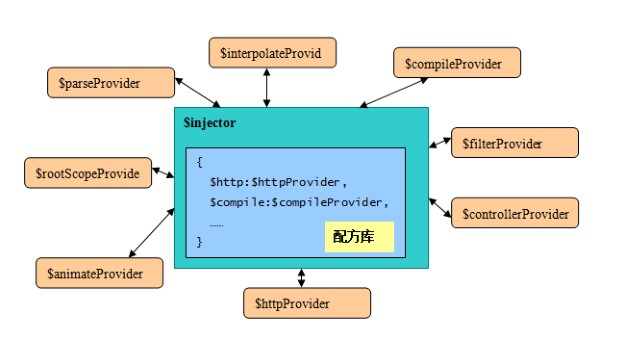AngularJS 的源码在整体上,与其它很多库和框架一样,是一个自执行函数,其整体结构简化如下:
//匿名自执行函数,保证angular.js加载完成后,立即执行其中的代码。 (function(window,document,undefined){ //判断代码angularjs重复加载 if(window.angular.bootstrap){ console.log("WARNING:Tried to load angular more than once."); return; } //绑定jQuery或者jqList,实现angular.element bindJQuery(); //暴露api,挂载一些通用方法,如:angular.forEach //实现angular.module,并定义模块ng,以及ngLocale publishExternalAPI(angular); //就是jQuery的$(document).ready(); jqLite(document).ready(function(){ //初始化入口 angularInit(document,bootstrap); }) })(window,document);

自动初始化

AngularJS API 之 $injector ---- 依赖注入

Dependency Injection (DI, 依赖注入 ) 是一种软件设计模式 , 用于处理如何让程序获得其依赖 ( 对象的 ) 引用。
注入器是 AngularJS 框架实现和应用开发的关键,这是一个 DI/IoC 容器的实现。
AngularJS 将功能分成了不同类型的组件分别实现,这些组件有一个统称 - 供给者 /provider , 下图中列出了 AngularJS 几个常用的内置服务:
AngularJS 的组件之间不可以互相直接调用,一个组件必须通过注入器才 可以调用另一个组件。这样的好处是组件之间相互解耦,对象的整个生命
周期的管理 甩给了注入器。

在 AngularJS 中也有依赖注入的概念,像 spring 中的依赖注入,但是又有所不同。 Spring 中使用构造注入或者设值注入的方式,还需要做一些额外的操
作,但是 angular 中只需要在需要的地方声明一下即可,类似模块的引用,因此十分方便。
参考: [angular api doc] (http://docs.angularjs.cn/api/auto/service/$injector)
推断式注入
这种注入方式,需要在保证参数名称与服务名称相同。如果代码要经过压缩等操作,就会导致注入失败。
app.controller("myCtrl1",function($scope,hello1,hello2){
$scope.hello = function(){
hello1.hello();
hello2.hello();
}
});
标记式注入
这种注入方式,需要设置一个依赖数组,数组内是依赖的服务名字,在函数参数中,可以随意设置参数名称,但是必须保证顺序的一致性。
var myCtrl2 = function($scope,hello1,hello2){ $scope.hello = function(){ hello1.hello(); hello2.hello(); } } myCtrl2.$injector = ["hello1","hello2"]; app.controller("myCtrl2",myCtrl2);
内联式注入
这种注入方式直接传入两个参数,一个是名字,另一个是一个数组。这个数组的最后一个参数是真正的方法体,其他的都是依赖的目标,但是要保证与
方法体的参数顺序一致(与标记注入一样)。
app.controller("myCtrl3",["$scope","hello1","hello2",function($scope,hello1,hello2){
$scope.hello = function(){
hello1.hello();
hello2.hello();
}
}]);
$injector 常用的方法
在 angular 中,可以通过 angular.injector() 获得注入器。
var $injector = angular.injector();
通过 $injector.get('serviceName') 获得依赖的服务名字
$injector.get("$scope");
通过 $injector.annotate('xxx') 获得 xxx 的所有依赖项 $injector.annotate(xxx)